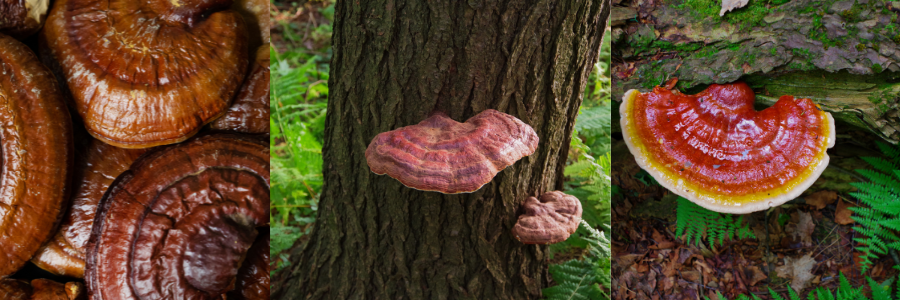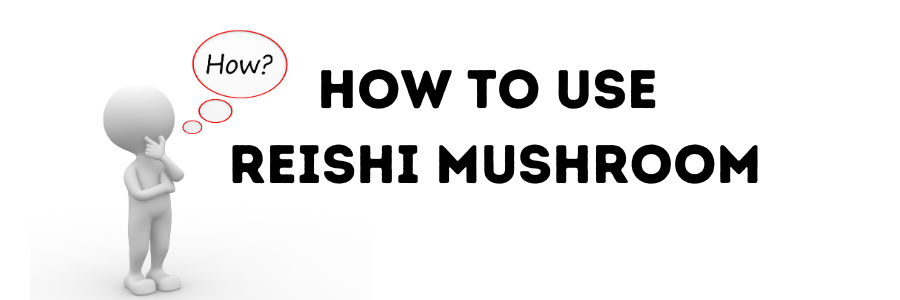Reishi Mushroom. One of the most beneficial mushrooms to use.
Mar 30th 2023
What Is Reishi Mushroom? Well I Am Glad You Asked!

Reishi mushroom, also known as Ganoderma lucidum, is a type of fungus that has been used for medicinal purposes for centuries in traditional Chinese medicine. It is a woody and tough mushroom that is found on the stumps of deciduous trees such as oak and maple, primarily in Asia. The fruiting body of the reishi mushroom has a distinctive kidney or fan-shaped cap that is shiny and red, although it can also be yellow or black. Reishi mushroom has a long history of use in traditional medicine, where it was believed to promote longevity, boost the immune system, and improve overall health. In recent years, scientific research has confirmed many of these health benefits and reishi mushroom has become a popular dietary supplement.

10 Benefits of Reishi Mushroom
Reishi mushroom, also known as Ganoderma lucidum, is a type of fungus that has been used for its medicinal properties in traditional Chinese medicine for centuries. In recent years, research has shown that reishi mushroom has numerous health benefits. In this response, I will discuss 10 health benefits of reishi mushroom supported by scientific evidence.
- Boosts Immune System: Studies have shown that reishi mushroom can enhance the activity of white blood cells, which are responsible for fighting infections and diseases. Reishi mushroom contains beta-glucans, a type of polysaccharide, which is believed to stimulate the immune system.
- Anti-cancer properties: Reishi mushroom contains compounds such as triterpenes and polysaccharides, which have been found to have anti-cancer properties. These compounds have been shown to inhibit the growth of tumor cells and prevent the spread of cancer cells.
- Reduces Inflammation: Reishi mushroom has been found to have anti-inflammatory properties, which can help to reduce inflammation in the body. Inflammation is believed to be the root cause of many chronic diseases such as arthritis, heart disease, and diabetes.
- Lowers Blood Pressure: Studies have shown that reishi mushroom can help to lower blood pressure. Reishi mushroom contains compounds that can relax blood vessels, which can help to reduce blood pressure.
- Reduces Cholesterol: Reishi mushroom has been found to have cholesterol-lowering properties. The polysaccharides in reishi mushroom have been shown to reduce the levels of LDL cholesterol, also known as “bad” cholesterol.
- Anti-aging properties: Reishi mushroom contains antioxidants, which can help to protect the body against free radical damage. Free radicals are believed to be a major contributor to the aging process.
- Improves Liver Function: Reishi mushroom has been found to have hepatoprotective properties, which means it can protect the liver from damage. Studies have shown that reishi mushroom can help to improve liver function in people with liver disease.
- Reduces Fatigue: Reishi mushroom has been found to have anti-fatigue properties. Studies have shown that reishi mushroom can help to reduce fatigue in people with chronic fatigue syndrome.
- Enhances Cognitive Function: Reishi mushroom has been found to have neuroprotective properties, which means it can protect the brain from damage. Studies have shown that reishi mushroom can enhance cognitive function in people with mild cognitive impairment.
- Improves Sleep Quality: Reishi mushroom has been found to have sleep-promoting properties. Studies have shown that reishi mushroom can help to improve sleep quality in people with insomnia.
In conclusion, reishi mushroom has numerous health benefits, including boosting the immune system, reducing inflammation, and reducing the risk of chronic diseases such as cancer, heart disease, and diabetes. Reishi mushroom can be consumed in supplement form or added to food and drinks. However, it is important to consult a healthcare professional before taking any new supplements.

How to Use Reishi Mushroom
Reishi mushroom can be consumed in different forms, including as a dietary supplement in capsules, tablets, powder, or tincture. It can also be added to food and drinks, such as soups, teas, and smoothies. Here are some ways to use reishi mushroom:
- Supplements: Reishi mushroom is available in the form of capsules, tablets, and powders. These supplements can be taken with water or added to smoothies or other beverages.
- Tea: Reishi mushroom tea can be made by steeping dried reishi mushroom slices or powder in hot water for 30-45 minutes. The tea can be sweetened with honey or other natural sweeteners if desired.
- Broth and soups: Dried reishi mushroom slices can be added to soups or broth for flavor and nutritional benefits.
- Tinctures: Reishi mushroom tinctures are made by extracting the active compounds in alcohol or glycerin. Tinctures can be added to water or other beverages.
- Powder: Reishi mushroom powder can be added to smoothies, yogurt, oatmeal, or other foods for an easy and convenient way to incorporate it into your diet.

What to look for when purchasing quality Reishi Mushrooms
When it comes to purchasing reishi mushrooms, it’s important to look for high-quality products to ensure maximum health benefits. Here are some tips for picking good quality reishi mushrooms:
- Look for certified organic: Choose reishi mushrooms that are certified organic to ensure they are free from pesticides and other harmful chemicals.
- Check the source: Reishi mushrooms grown in the wild may contain contaminants or toxins. Look for mushrooms that are grown in a controlled environment or harvested from a clean and uncontaminated source.
- Check the color and texture: The fruiting body of the reishi mushroom should be firm and woody with a shiny cap that is red, black, or yellow. Avoid mushrooms that are soft, moldy, or discolored.
- Check the label: Check the label for information on the extraction method and the amount of active compounds in the product. Look for products that use a high-quality extraction method and contain a high percentage of beta-glucans and triterpenoids, the two main active compounds in reishi mushrooms.
- Buy from a reputable source: Buy reishi mushrooms from a reputable source, such as a health food store or an online retailer with positive customer reviews.
- Consider the form: Consider the form of reishi mushroom that you want to use. Capsules, powders, and tinctures are convenient options, but make sure they contain pure reishi mushroom extract without any additives or fillers.
By following these tips, you can choose high-quality reishi mushrooms and enjoy the many health benefits they offer.
Although reishi mushroom is generally considered safe for most people, there are some cautions to keep in mind when using it. Here are some of the potential risks and cautions associated with using reishi mushroom:
- Allergic reactions: Some people may be allergic to reishi mushroom, and symptoms may include rashes, itching, and difficulty breathing. If you experience any of these symptoms after using reishi mushroom, stop using it and seek medical attention.
- Blood-thinning effects: Reishi mushroom may have blood-thinning effects, which can increase the risk of bleeding. If you are taking blood-thinning medications or have a bleeding disorder, consult your healthcare provider before using reishi mushroom.
- Low blood pressure: Reishi mushroom may lower blood pressure, which can be problematic for people with low blood pressure or those taking medications that lower blood pressure.
- Immune system stimulation: Reishi mushroom can stimulate the immune system, which may be beneficial for some people but can be harmful for those with autoimmune diseases or taking immunosuppressive medications.
- Drug interactions: Reishi mushroom may interact with certain medications, such as blood-thinning medications, immunosuppressive drugs, and chemotherapy drugs. Consult your healthcare provider before using reishi mushroom if you are taking any medications.
- Pregnancy and breastfeeding: There is not enough research to determine the safety of reishi mushroom during pregnancy and breastfeeding. It is recommended to avoid using it during these times.
- Side effects: Reishi mushroom may cause side effects such as upset stomach, dry mouth, dizziness, and skin irritation in some people.
Overall, it is important to talk to your healthcare provider before using reishi mushroom or any other dietary supplement, especially if you have any health conditions or concerns


